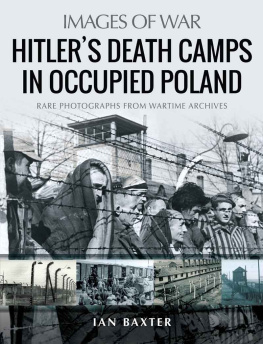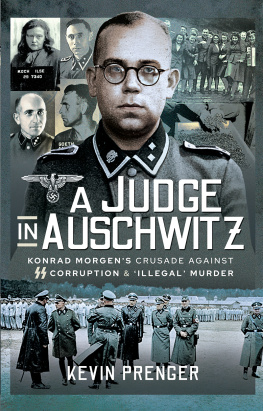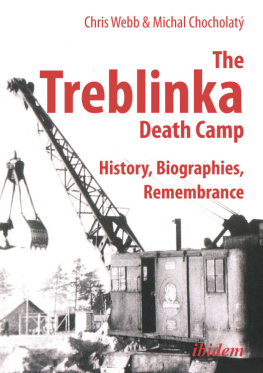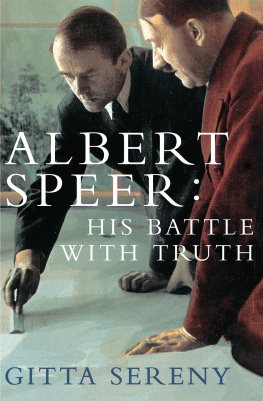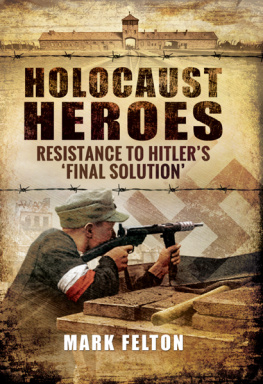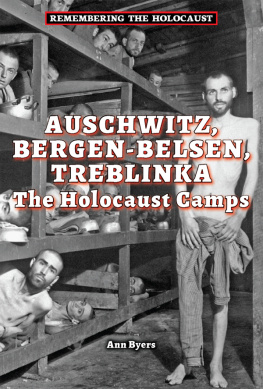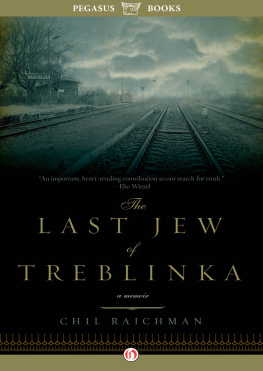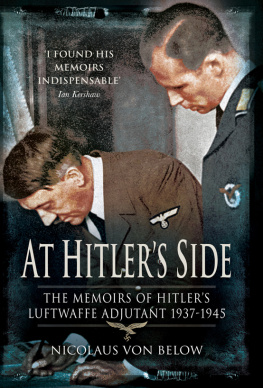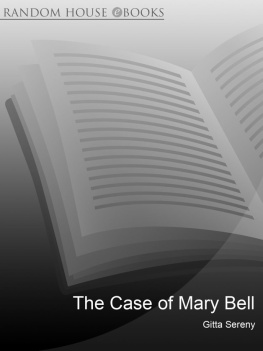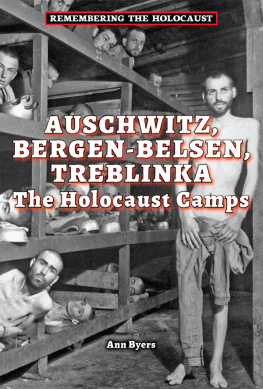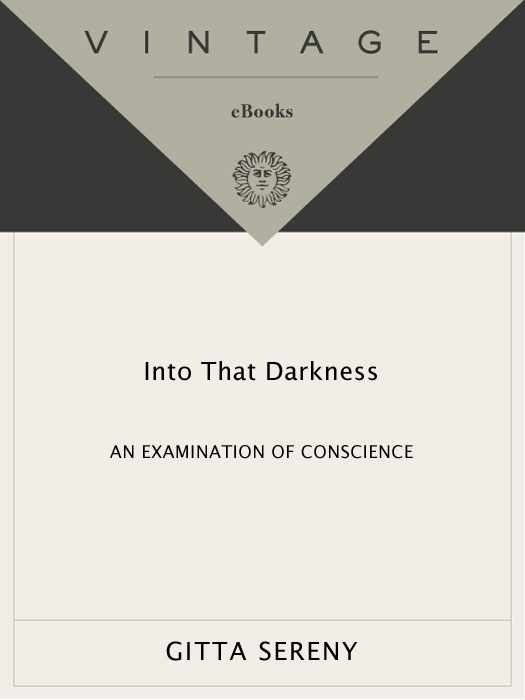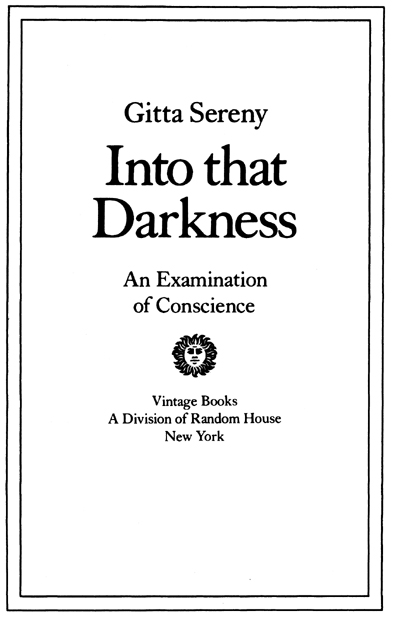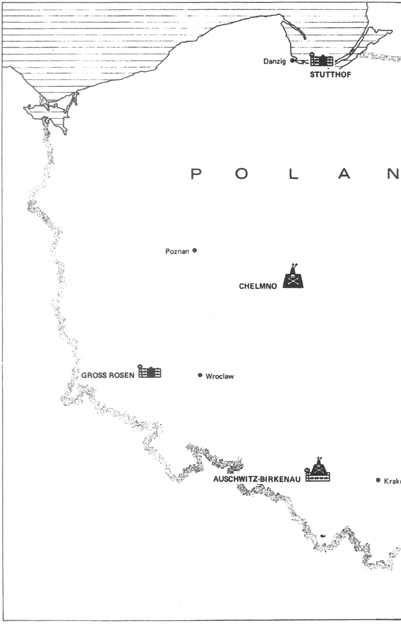
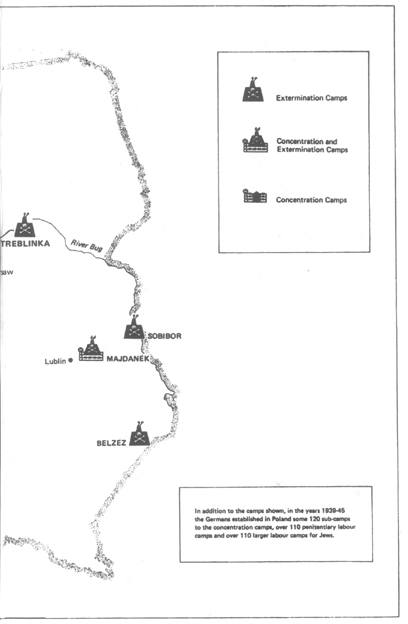
First Vintage Books Edition, January 1983
Copyright 1974 by Gitta Sereny
All rights reserved under International and Pan-American
Copyright Conventions. Published in the United States
by Random House, Inc., New York. Originally published in
England by Andre Deutsch Limited, London, and in the
United States by McGraw-Hill, Inc., New York, 1974.
Library of Congress Cataloging in Publication Data
Sereny, Gitta.
Into that darkness.
Originally published: London : Deutsch, 1974.
Bibliography: p.
1. World War, 19391945Prisoners and prisons, German.
2. Concentration campsEurope.
3. Stangl, Franz.
I. Title.
D805.G3S456 1982 940.54724304355 82-40049
eISBN: 978-0-307-76106-4
v3.1
To Don
and to our children Mandy and Chris,
and to Elaine
Everywhere the human soul stands between a hemisphere of light and another of darkness
Thomas Carlyle (17951881)
The power of choosing between good and evil is within the reach of all.
Origen (c185254)
Contents
Plans
Acknowledgments
I am indebted to many people and organizations for their help in the preparation of this book.
Of the latter I must thank first and foremost the German judicial authorities who gave me access to Dsseldorf prison and Franz Stangl, and particularly the Governor of the prison, Herr Eberhard Mies and his wife, for their kindness throughout those strenuous weeks. I am grateful too to the Polish authorities for their help in Poland, and the Austrian Ministries of the Interior and Justice for their assistance in Vienna.
Chief Prosecutor Adalbert Rckerl, Director of the Central Authority for Investigation into Nazi Crime, in Ludwigsburg, and his colleagues have spared no effort to assist me ever since my first research into this subject for a series of articles on the Nazi crime trials for the Daily Telegraph Magazine in 1967.
The Institute for Contemporary History in Munich, and in particular Dr Lothar Gruchmann from whose work on Euthanasia in the Third Reich I quote in this book, provided a wealth of documentary material. I also thank the West German Bundesarchiv in Koblenz.
I am particularly indebted to the Wiener Library in London and to their extraordinarily knowledgeable staff. I dont think any serious book on National Socialism could be undertaken without the help of this unique institution.
The two men in West Germany who I believe know more than anyone else now about specific Nazi crimes are Chief Prosecutors Alfred Spiess and Kurt Tegge. Kurt Tegge has spent years on the Einsatzgruppen trials in Hamburg, and Alfred Spiess prosecuted both in the Treblinka trial and the Stangl trial in Dsseldorf. I am grateful to both of them for so liberally sharing their knowledge with me. No formal expression of gratitude could possibly do justice to the amount of practical help and advice I had from Alfred Spiess. Neither of these men, of course, necessarily share my opinions or my evaluation of the individuals I discuss in this book.
I thank Count Eduard Raczynski, former Foreign Minister of the Polish Government in Exile; Mr Adam Ciolkosz, former Socialist Member of Parliament in Poland; and M. Kazimierz Pape, former Polish Ambassador to the Holy See, for their interest in this book and for their considerable help. Equally I thank Vienna City Counsellor Herr Hubert Pfoch for allowing me to quote his extraordinary wartime diary and the use of the photographs he took as a courageous young man in Poland.
A special word of thanks to Horst Mnzberger who permitted me to gain insight, and briefly to share with him, a staggering human conflict.
I also want to thank in this particular section of the acknowledgments a number of men and women who consented to talk to me but asked not to be quoted, or for whom it would obviously have been damaging to be named.
I owe thanks to many of my friends for their concern for me during the years I worked on this book.
Above all perhaps to Ruth Alice and Klaus von Bismarck and their (many) children and young relatives. Theirs is the new Germany which I love and trust: it is my luck to have them as my friends.
To Catherine Valabregue for sunny breaks in France and for our home from home in Paris. To Mdi and Hansibert Trring for their ever-open door and the lovely peace of Seefeld on so many occasions. To Sally and Philip Dowson for the constant reassurance of their friendship. To Ronald Preston for his unstinting help. To Amador Aguiar in Brazil, whose interest reinforced my belief in the universal application of the problems this book is concerned with.
My gratitude (again) to John Anstey, Editor of the Daily Telegraph Magazine, for his unfailing receptiveness to complex and often controversial ideas.
To Nina van Pallandt and to Enrique Arias for their encouragement after ploughing through a rough draft; and to Paul Neuburg at the same stage for his particularly valuable criticisms, every one of which was justified.
To Alice Hammerstein Mathias for her research in poetry and for finding exactly the right words in Carlyle and above all Origen.
I want to thank my old and dear friend Paul Palmer for his faith in a very young writer years ago: this, I think, may be the book he meant.
Diana Athill edited Into That Darkness. She has lent it and me her warmth, her intelligence, her literary fluency, and a quality of involvement I had little right to expect. I am grateful that she has become my friend. And I also thank my American editor, Berenice Hoffman, whose perspicacity saved me from serious blunders.
The stability of both my children in the face of considerable odds, and the gaiety and happiness of my daughter Mandy throughout, were my most valuable support during the past three years.
And, above all, I thank my husband, Don Honeyman, who has contributed to and is part of every aspect of the work on this book.
Gitta Sereny Honeyman
London, June 1973
The photographs of Franz Stangl in prison and talking to the author are by Don Honeyman. The photograph of Treblinka now is from the collection of Alexander Bernfes.
Preface
My dialogues with Franz Stangl, Kommandant of Sobibor and Treblinka, which were published in an abbreviated version in October 1971 in the Daily Telegraph Magazine in England (and subsequently in magazines throughout the world), represent the framework upon which this book is constructed: its focus. But they are finally only a small part of it.
I originally conceived the idea of talking with Stangl when, attending his trial in Germany in 1970 (as, in the course of journalistic work, I had attended other Nazi crime trials), I realized that whatever else he might have been, he was, unlike many others I had observed under similar circumstances, an individual of some intelligence.
He was the only Kommandant of an extermination camp who had been brought to trial. There were, extraordinarily enough, only four men who specifically filled that function: one is dead, and two have managed to disappear from sight. I had felt for many years that, despite the great number of books and films on the Nazi era, there was a whole dimension of reactions and behaviour we had never yet understood and which yet is deeply relevant to the pressures and perils which beset us now and may threaten us in the future.


